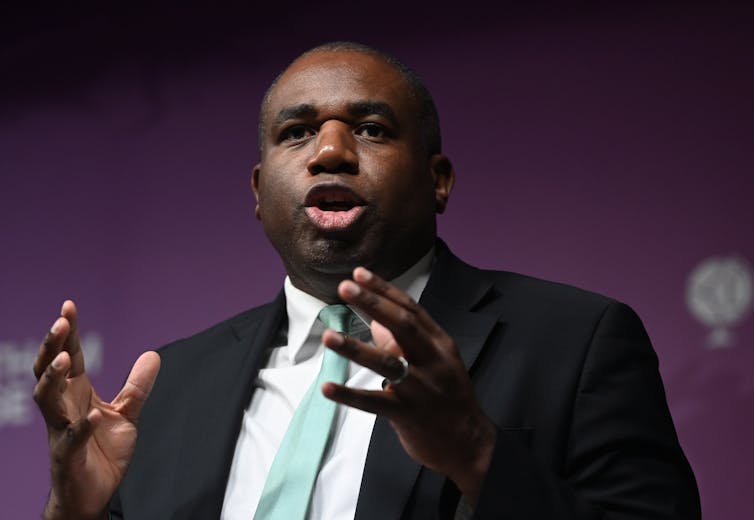Assuming a Labour win in the UK general election – always a risky assumption given Labour’s proclivity for snatching defeat from the jaws of victory – the “Global Britain” bombast emanating from the United Kingdom will cease.
Good relations with Australia will continue, however, due to AUKUS, the Australia–UK free trade agreement and the diplomatic groundwork laid by governments of both major parties in Canberra and London.
In truth, the “Global Britain” rhetoric has already been quietly dropped. Developed during the UK’s protracted withdrawal from the European Union, the idea of repositioning the country as a world leader (for example in trade, security, vaccines and just about everything) was always too closely associated with the boosterism of former prime minister Boris Johnson and the record-breakingly brief premiership of Liz Truss to survive a switch to a more “sensible” form of government under Rishi Sunak.
However, the fundamentals of the Australia–UK relationship remain solid. There was a time when British and Australian ministers would meet, say how well the two countries got on, make jokes about cricket and then struggle to find anything meaningful to discuss. But times have changed.
The UK Conservative government actively courted a revived relationship with Australia even before Brexit. The UK’s withdrawal from the EU provided an opportunity for Australia to sign another free trade agreement – widely but quietly assumed to work in Australia’s favour – and do so while asserting what great mates the two countries are. AUKUS then put the relationship on a renewed strategic footing.
Labour’s path to victory
This brings us to the electoral geography of Labour’s chances of gaining the keys to 10 Downing Street. The submarine-building program of AUKUS is good for jobs in the north of England. Winning back working-class votes in the so-called “Red Wall” of northern English constituencies, after Labour’s disastrous showing in 2019, is central to Labour’s hopes of victory.
Under Sir Keir Starmer, party leader since 2020, Labour has worked hard – too hard, some might say – to win back socially conservative voters who abandoned the party due to its equivocation on Brexit under the unpopular Jeremy Corbyn.
In contrast to the left-wing Corbyn, Starmer has embraced the Union Jack, broken his silence on Brexit to quash hopes of the UK ever rejoining the EU, and rolled back pledges for green initiatives.
This will no doubt cost Labour some support from progressive voters. Starmer’s handling of the party’s response to the conflict in Gaza has already lost some support among Muslim voters who typically vote Labour. Nevertheless, the electoral calculation is that progressives cannot bring themselves to vote for the Conservatives, so their vote can be banked.
But people can choose not to vote at all in the UK, and many may decide to stay away on election day. This could depress the vote for both major parties.
The rise of minor parties
This leaves the door open for minor parties to have an outsized effect on July 4.
The Conservatives may lose votes to their right and left. Socially conservative right-wing voters, energised by the anti-woke tactics of the evermore right-leaning Tories, can vote for Reform UK.
This party is the successor to the radical populist UK Independence Party and the Brexit Party, both formerly led by Nigel Farage. At the previous election, Farage did the Tories a huge favour and declined to run candidates against Brexit-supporting Conservatives. With Brexit done, Farage’s successor at the head of Reform, Richard Tice, is unlikely to be so generous.

On their left, the Conservatives may also lose support from moderate voters (those put off by their anti-woke tactics) in the so-called “Blue Wall” of usually Conservative-voting constituencies in the south of England. These people, if they vote at all, may vote for the centrist Liberal Democrats.
And in Scotland, the pro-independence Scottish National Party is having struggles of its own. It’s been in government since 2007 and is plagued by leadership problems. Its loss may well be Labour’s gain as it seeks to win back votes it lost to the SNP after the independence referendum in 2014.
New soundtrack for an old friendship
So, if Labour does get back into Downing Street there will be a change of mood music in the Australia–UK relationship.
When the Conservatives were in power in London and the Coalition was in power in Canberra, the two governments saw eye-to-eye ideologically. There was talk in the media of the Anglosphere shaping international relations and even saving the West (from itself).
Assuming the current shadow foreign secretary, David Lammy, stays in his post if Labour forms the next government, the UK will be much more focused on repairing relations with the EU in general and France in particular (see AUKUS) than directly focused on the Indo-Pacific. It may be the UK’s capabilities in this region have been overstated by the Conservative government.

Labour is far less enamoured with the supposed benefits of unfettered free trade than the “Global Britain” wing of the Conservative Party. Nonetheless, the UK–Australian free trade agreement is in place and here to stay.
All in all, it would take a lot to push Australia and the UK apart, although it’s happened in the past. The major threat to AUKUS will not be from a change of government in London, but from a different president in Washington.
If Labour wins government on July 4, some of the inflated hopes for the Australia–UK relationship will recede. But the two countries will still be great mates, and the jokes about cricket will be back for another innings, just with a different captain.

